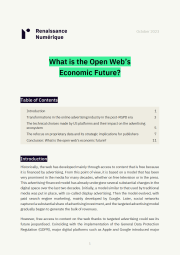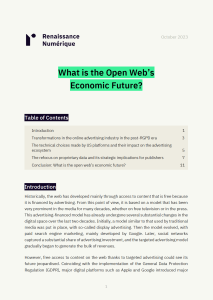Publication 12 December 2023
What is the Open Web’s Economic Future?

Historically, the web has developed mainly through access to content that is free because it is financed by advertising. From this point of view, it is based on a model that has been very prominent in the media for many decades, whether on free television or in the press. This advertising-financed model has already undergone several substantial changes in the digital space over the last two decades. Initially, a model similar to that used by traditional media was put in place, with so-called display advertising. Then the model evolved, with paid search engine marketing, mainly developed by Google. Later, social networks captured a substantial share of advertising investment, and the targeted advertising model gradually began to generate the bulk of revenues.
However, free access to content on the web thanks to targeted advertising could see its future jeopardised. Coinciding with the implementation of the General Data Protection Regulation (GDPR), major digital platforms such as Apple and Google introduced major technical changes to the way online targeted advertising works. These changes are already having an impact on the current advertising ecosystem. In 2024, this data will no longer be accessible, following decisions initiated by Google. The funding of the web through advertising could be significantly affected by these changes.
At the same time, emerging players in the digital space, led by e-commerce websites and audio and video streaming companies, are securing a growing share of advertising investment. These market transformations, which are already visible, could have a major impact on the advertising revenues of news publishers and change the range of free digital services available to consumers and citizens, leading to profound changes on the world wide web.
What impact are these changes having on the open web model? Can this model survive economically, and if so, how? Find out more in this short note!
The members of Renaissance Numérique's "Digital Economy" commission
-

Henri Isaac (lead)
Associate Professor,
Paris Dauphine University - PSL
-

Philippe Caila
La Fabrique Digitale director,
Caisse des Dépôts Group
-

Benjamin Greze
Lawyer in the "Technologies, Media, and Telecommunications" division,
Pinsent Masons
-

Damien Jacob
Professor of web strategies, e-Commerce and e-Business,
Liege University
-

Carole Leboucq
Stake Holders Dialogues Manager,
Orange
-

Sophie Le Pallec
Public Affairs Manager,
GS1 France
-

Marine Pouyat
Expert consultant in data protection and privacy
-

Annabelle Richard
Associate lawyer in the "Technologies, Media, and Telecommunications" division,
Pinsent Masons
-

Publication 3 August 2020
Digital platforms: For a real-time and collaborative regulation
-

Publication 7 October 2015
Platforms and competitive dynamics


